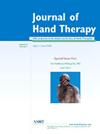手部手术后的日常生活管理--对协调感弱患者的定性研究
IF 2.1
4区 医学
Q2 ORTHOPEDICS
引用次数: 0
摘要
背景与协调感(SOC)较强的患者相比,协调感较弱的患者的手部相关障碍(HRD)对其参与日常生活的影响更大。因此,了解手部相关障碍(HRD)患者在接受手部手术后如何处理日常生活中的各种状况具有重要的临床意义。本研究旨在探讨手部相关障碍(HRD)患者在接受手部手术后如何体验和处理日常生活中的各种状况。在手部手术后的 6 到 13 周之间,对不同 HRD 的参与者进行了一次访谈。结果分析得出了五个主题:需要处理的情况更多、日常生活中的挑战、日常生活的管理、不同的期望以及信息对日常生活的影响。大多数参与者的生活受到了严重影响:他们在手术后的活动和角色管理方面遇到了一系列困难。参与者对日常生活和未来的管理感到不确定,并因不同原因表达了无法实现的期望。结论参与者在生活中有多种情况给他们的日常生活带来挑战,而人力资源开发使他们的日常生活更具挑战性。他们感到受影响的程度似乎与他们对手术前活动的看法有关。他们有几种处理日常生活的策略,但使用程度不一。他们对手术结果的预期对其处理日常生活的能力既有积极影响,也有消极影响,因此要求提供适合个人情况的信息,说明手术后的预期以及如何应对日常生活。本文章由计算机程序翻译,如有差异,请以英文原文为准。
Management of everyday life after a hand operation—A qualitative study of patients with a weak sense of coherence
Background
A hand-related disorder (HRD) has a more significant impact on participation in everyday life for patients with a weak sense of coherence (SOC) compared to those with a strong SOC. Therefore, understanding how patients with a weak SOC manage the conditions of everyday life after a hand operation is of clinical interest.
Purpose
This study aimed to explore how patients with a weak SOC experience and manage the conditions of everyday life after an operation for an HRD.
Study Design
A qualitative design with a hermeneutic approach.
Methods
An in-depth interview was conducted with each of eight adults—five women and three men—with an HRD and a weak SOC (SOC-13 score <52). Participants with varying HRDs were interviewed once between six and 13 weeks after the hand operation. Data were analyzed based on a hermeneutic approach.
Results
The analyses resulted in five themes: even more conditions to handle, challenges in everyday life, managing everyday life, different expectations, and the influence of information on everyday life. The lives of most participants were significantly impacted: they experienced a range of difficulties managing their activities and roles after their operation. The participants felt uncertain about managing everyday life and the future and expressed unfulfilled expectations for different reasons. All wanted individualized information about what to expect.
Conclusions
Participants had several conditions in life that challenged their everyday lives, and the HRD made their everyday lives even more challenging. The extent to which they felt affected appeared to relate to their perception of their presurgery activities. They had several strategies to manage everyday life but used these to varying extent. Their expectations about the outcome had both positive and negative effects on their ability to manage everyday life, and individually adapted information was requested about what to expect and how to cope with everyday life after the surgery.
求助全文
通过发布文献求助,成功后即可免费获取论文全文。
去求助
来源期刊

Journal of Hand Therapy
医学-外科
CiteScore
3.50
自引率
10.00%
发文量
65
审稿时长
19.2 weeks
期刊介绍:
The Journal of Hand Therapy is designed for hand therapists, occupational and physical therapists, and other hand specialists involved in the rehabilitation of disabling hand problems. The Journal functions as a source of education and information by publishing scientific and clinical articles. Regular features include original reports, clinical reviews, case studies, editorials, and book reviews.
 求助内容:
求助内容: 应助结果提醒方式:
应助结果提醒方式:


